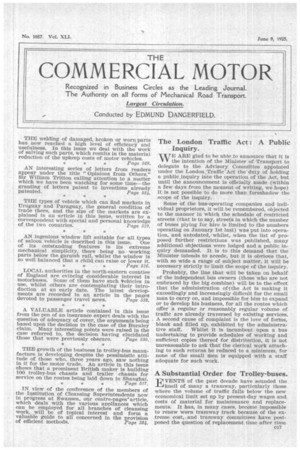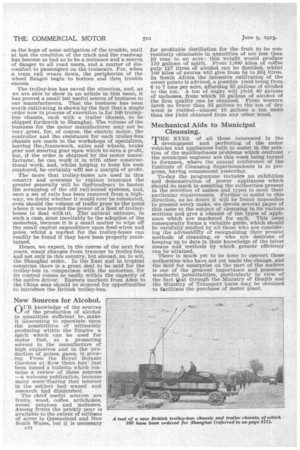The London Traffic Act : A Public Inquiry.
Page 1

Page 2

If you've noticed an error in this article please click here to report it so we can fix it.
WE ARE glad to be able to announce that it is the intention of the Minister of Transport to delegate to the Advisory Committee appointed under the London.Traffic'Act the duty of holding a public _inquiry into the operation of the Act, but until the announcement is officially made (within a few days from the moment of writing, we hope) it is not possible to do more than foreshadow the scope of the inquiry.
Some of the bus-operating companies and individual proprietors, it -will be remembered, objected to the manner in which the schedule of restricted streets (that is to say, streets in which the number of buses plying for hire is limited to the numbers operating on January 1st last) was put into operation, and antedated,' whilst, when the list of proposed further restrictions was published, many additional objections were lodged and a public inquiry demanded. It is to this demand that the Minister intends to accede, but it is obvious that, with so wide a range of subject matter, it will be necessary strictly to limit the scope of the inquiry.
Probably, the line that will be taken on behalf of the Independent bus owners (those who are not embraced by the big combine) will be to the effect that the administration oft he Act is making it exceedingly and increasingly difficult for the small man to carry On, and impossible for him to expand or to develop his business, for all the routes which offer a regular or reasonably regular volume of traffic are already traversed by existing services. A second cause of complaint is the love of forms, blank and filled up, exhibited by the administrative staff. Whilst it is incumbent upon a bus undertaking to provide schedules of working and sufficient copies thereof for distribution, it is not unreasonable to ask that the clerical work attaching to such returns be reduced to a minimum, for none of the small men is equipped with a staff adequate for such work.
A Substantial Order for Trolley-buses.
VENTS of the past decade have sounded the j ' knell of many a tramway, particularly those where the volume of traffic falls below the new economical limit set up by present-day wages and costs of material for maintenance and replacements. It has, in many, cases, become impossible to renew worn tramway track because of the extreme cost, and tramway committees have postponed the question of replacement time after time in the hope of some mitigation of the trouble, until at last the condition of the track and the roadway has become so bad as to be a nuisance and a source, of danger to all road users, and a matter of discomfort to passengers on the tramcars. For, when a tram rail wears down, the peripheries of the wheel flangeS begin to bottom and then trouble ensues.
The trolley-bus has saved the situation, and, as we are able to show in an article in this issue, it has proved a small but useful source of business to our manufacturers. That the business has been worth cultivating is shown by the fact that a single order now in process of execution is for 100 trolleybus chassis, each with a trailer chassis, to be shipped forthwith to Shanghai. The volume of the business for the motor manufacturer may not be very , great, for, of course, the electric motor, the controller and the resistance for each trolley-bus chassis are made in the workshops of specialists, leaving the ‘framework, axles and wheels, brake gear and steering gear upon which to earn a profit, but, if the order is obtained by the motor manufacturer, he can work it in with other constructional work, and, whilst helping to keep his men employed, he certainly will see a margin of profit.
The more that trolley-buses are used in this country and overseas to replace tramcars the greater generally will be theltendency to hasten the scrapping of the old rail-bound systems, and, once a set of rails has been removed from a highway, we doubt whether it would ever be reinstated, even should the volume of traffic grow to the point where it was beyond the power of a fleet of trolley,. buses to deal with tit. ['he natural outcome, in such a case, must inevitably be the adoption of the motorbus, because it is a small matter to wipe off the small capital expenditure upon feed-wires and poles, whilst a market for the trolley-buses can readily be found if they have been properly maintained.
Hence, we expect, in the course of the next few years, many changes from tramcar to trolley-bus, and not only in this country, but abroad, as, to wit, the Shanghai order. In the East and in tropical countries there is a great deal to be said for the trolley-bus in comparison with the motorbus, for its control comes so easily within the capacity of the native driver. Eastern markets from Aden to the China seas should be scoured for opportunities to introduce the British trolley-bus.
New Sources for Alcohol.
(ATM knowledge of the sources of the production of alcohol in quantities sufficient to-, make it interesting to speculate upon the possibilities of ultimately producing within the Empire a spirit which can be used for motor fuel, as a promoting solvent in the manufacture of high explosives and in the production of poison gases, is growing. From the Royal Botanic Gardens at ,Kew there has just been issued a bulletin which contains a review of these sources —a welcome publication, because many werelfearing that interest In the subject had waned and research had diminished.
The chief useful sources are fruits, wood, coffee, artichokes, sweet potatoes and molasses. Among fruits the prickly pear is available to the extent of millions of acres in Queensland and New South Wales, but it is necessary el B for profitable distillation for the fruit to be conveniently obtainable in quantities of not less than 10 tons to an acre : this weight would produce 110 gallons of spirit. From 1,000 kilos of coffee pulp 127 litres of alcohol can be distilled, whilst 100 kilos of acorns will give from 8i to 20i litres. In South Africa the intensive cultivation of the sweet potato is advised, a possible yield being from 6 to 7 tons per acre, affording 35 gallons of alcohol to the ton. A ton of sugar will yield 40 gallons of molasses, from which 16 gallons of alcohol of the first quality can be obtained. From western larch no iewer than 33 gallons to the ton of dry wood is yielded—almost 10 gallons a ton more than the yield obtained from any other wood.
Mechanical Aids to Municipal Cleansing.
THE EYES of all those interested in the development and perfecting of the motor vehicles and appliances built to assist in the solution of the multitudinous problems which confront the municipal engineer are this week being turned to Swansea, where the annual conference of the InStitute of Cleansing Superintendents is in progress, having commenced yesterday.
To-day the programme includes an exhibition and demonstration of power appliances which should do much in assisting the authorities present in the selection of makes and types to meet their particular requirements. Further to assist in this direction, as no doubt it will be found impossible to present every make, we devote several pages of this issue to the subject of cleansing in its various sections and give a resume of the types of appliance which are marketed for each. This issue consequently forms a valuable guide, which should be carefully studied by all those who are considering the advisability of reorganizing their present methods of cleansing, or who are desirous of keeping up to date in their knowledge of the latest means and methods by which greater efficiency can be attained.
There is much yet to be done to convert those authorities who have not yet made the change, and the field for enterprise on the part of the makers is one of the greatest importance and possesses wonderful potentialities, particularly in view of the fact at through the Ministry of Health and the Ministry of Transport loans may be obtained to facilitate the purchase of motor plant.






























